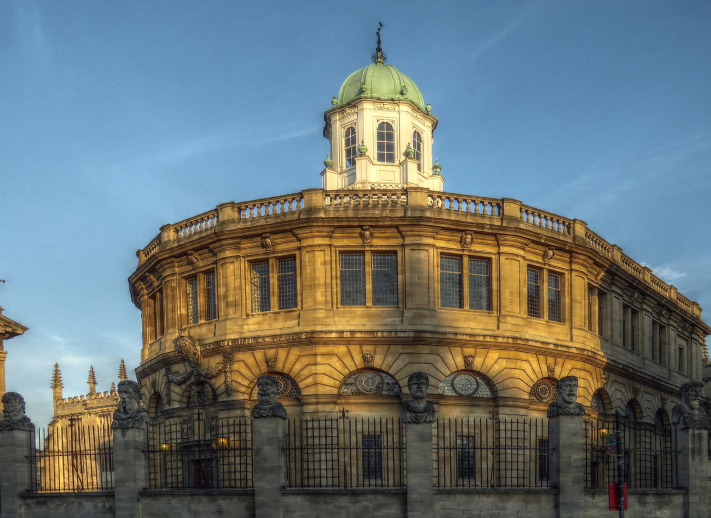The Sheldonian Theatre last Wednesday was like an upturned beehive as it was readied for the rehearsal for the evening's Haydn and Mozart. I found Marios Papadopoulos, Founder and Artistic Director of the Oxford Philharmonic Orchestra, serenely playing some bars from the 'Jeunehomme' Piano Concerto in the middle of the floor while figures all around him scurried to set up music stands and shift furniture.
So how had Orchestra weathered the Covid tempest? Remarkably, no staff member was furloughed. The fact of the lockdown waiving of their salaries by Marios and Chief Operating Officer Anthi Papadopoulos must not only have direct bearing on that non-furloughing, but also demonstrates leadership by personal example, surely derived from their intense sense of pride in the Orchestra's standing, output and personnel.
I asked Marios what other income sources could be tapped to keep the show on the road. 'The Government's financial support has been really wonderful', he says, 'and the Arts Council came up with grants'. Filming rights for the Orchestra's streamed performances were secured, and the battery of OP patrons has been a bedrock of support.
Given that, owing to the limited capacity of the Sheldonian, live concerts in normal times make a loss, which of course has to be made up from other sources, in a perverse way the enforced absence of live concerts may even have given succour to the balance sheet. But Marios expressed deep concern for the plight of self-employed musicians during the lockdown. The OP has in recent years steadily advanced in its ability to field its own contracted musicians rather than rely on 'fixers' to plug the gaps. Its core players are expected to play at 60–70% of concerts. Simon Rattle recently warned of quality freelancers leaving the industry in search of greater financial security elsewhere, so this is very much a hot topic. The Orchestra also found ways to continue its vital outreach-to-schools work. It proved highly adaptable, with a shift to online and via streaming.
As regards the future, it's 10 years now since the OP's mission to draft in internationally-known artists was launched, and the pandemic has derailed none of that drive. Any drawing-back would be inconceivable in the light of Maxim Vengerov, widely hailed as our finest living violinist, having described the OP as one of the top 20 orchestras in the world. These giants of their calling cannot be paid at their full rate – a fact they're willing to accept in order to play in this city with this orchestra and this conductor.
Oxford will remain the bedrock of the programming. October's Autumn series will be announced in September. Artists playing in the City will include in December violinist Anne-Sophie Mutter, once a protégée of Herbert von Karajan, and Mitsuko Uchida, whom I think of as the peerless interpreter of the Mozart and Beethoven piano repertoire, playing a selection of Lieder. Both pianist Andras Schiff, very active with the past annual piano festivals and Maxim Vengerov, ex-artist-in-residence, will continue their close association with the OP.
The Welsh operatic colossus Bryn Terfel will be singing an all-Wagner programme – his fans will kill to get their hands on tickets – and another singer, Romanian Angela Gheorghiu, billed as 'the world's most glamorous opera star', will be tackling arias from Verdi, of whose music she's a specialist.
Beyond Oxford, the sans pareille Martha Argerich, just turned 80, will be playing the Beethoven Piano Concerto No. 1 with the Orchestra next April in Munich as an element in the OP's aim to play c. 60 concerts per year. Highlights will be a maiden booking in June at New York's Carnegie Hall to include Vengerov playing the crowd-pleasing Max Bruch's Violin Concerto, and also that month in Germany for the 75th year of Oxford-Bonn twinning there will be a performance of Beethoven's Ninth Symphony. Then in 2023, the OP's 25th Anniversary year, a second New York concert, this time at the well-known St Thomas' Church on Fifth Avenue, will represent a second foray into the East Coast music scene.
As we wind up the interview, I ask about my own favourites from the repertoire. Sibelius' Fifth Symphony has twice featured in recent years, but what about more of him; even a complete cycle of the seven symphonies? The response is in each case the same as in our last interview. 'Yes, perhaps, but under another conductor'. More Mahler and Bruckner? Indeed, but consider the logistical problem: the big orchestras required in the confined Sheldonian space, so that precious seating would have to be taken out.
Marios is now 66. Is there any hint of slowing down, of resting on laurels? Not a bit of it. In this case, diminuendo must give best to crescendo.




